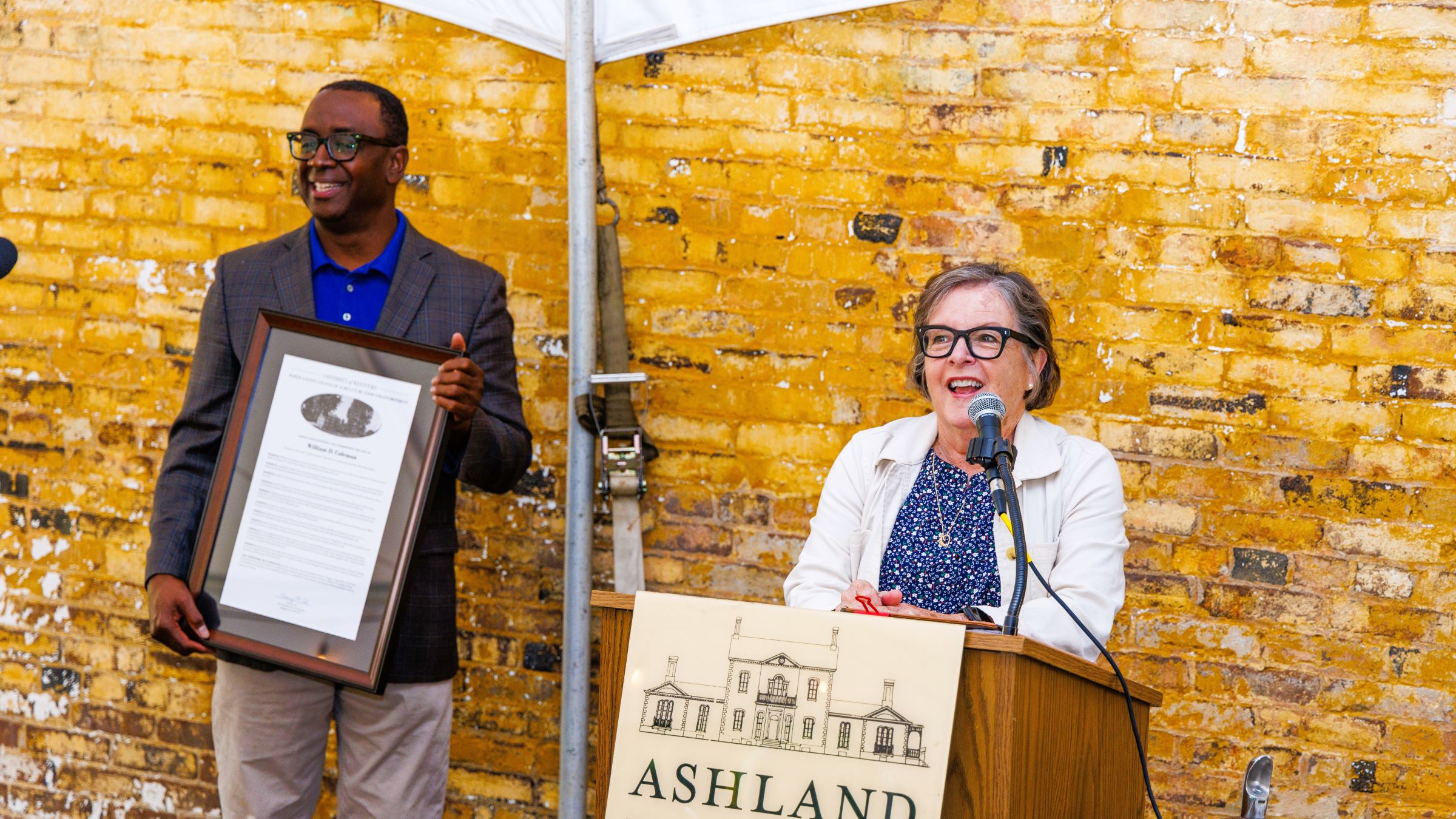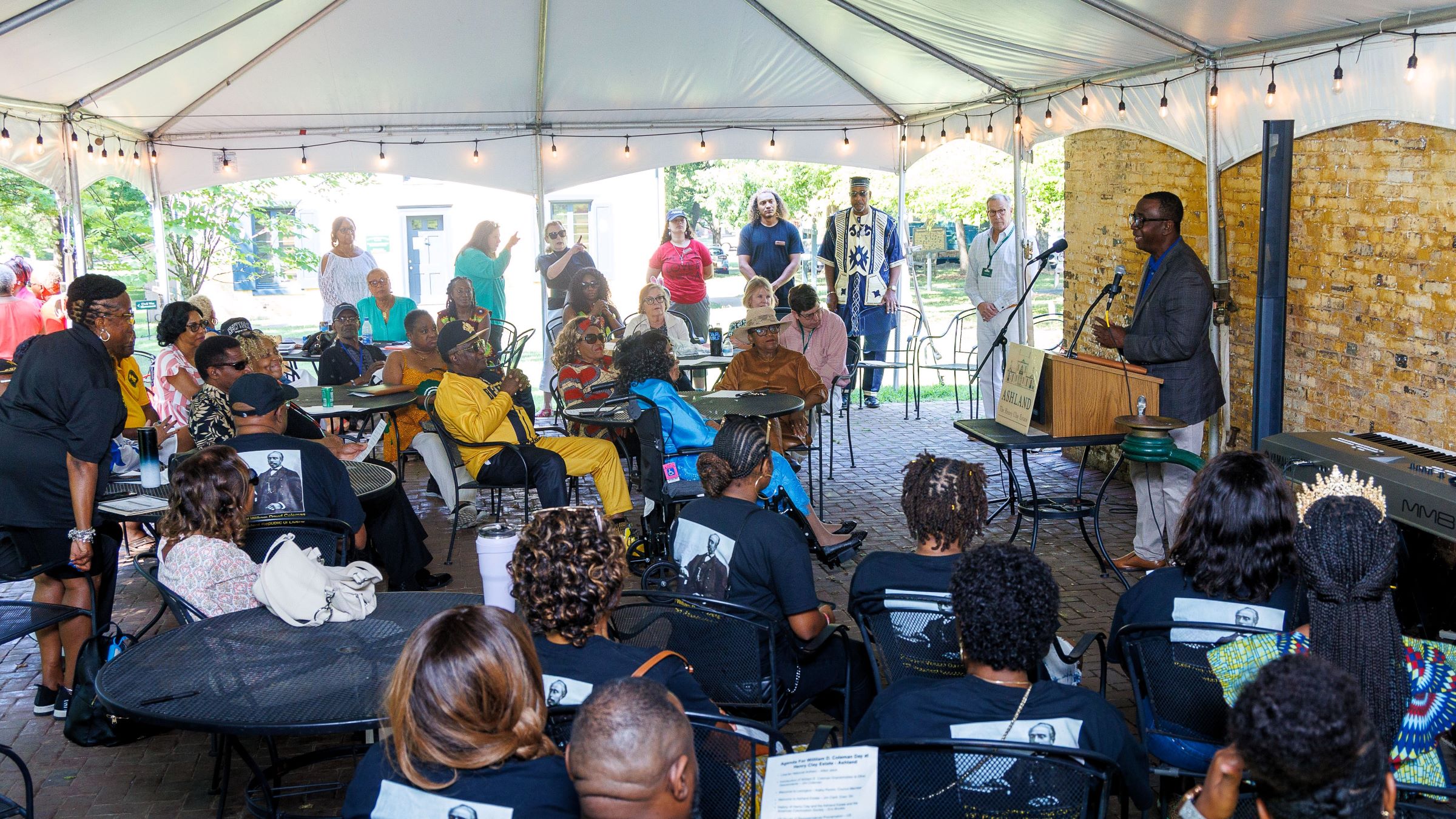Kentucky native William D. Coleman honored with distinguished resolution, commending his life and legacy
Kentucky native William D. Coleman honored with distinguished resolution, commending his life and legacy


Family, friends, leaders and the community graced the Ashland, Henry Clay Estate for a resolution ceremony to celebrate and honor the life of Fayette County, Kentucky, native William D. Coleman.

Born into slavery, Coleman emigrated to Liberia at an early age with his family. Through hard work and determination, Coleman became a successful carpenter, farmer, trader and politician, eventually becoming the 13th Liberian president.
Through a formal resolution, Nancy Cox, University of Kentucky vice president for land-grant engagement and Martin-Gatton CAFE dean, expressed the College’s gratitude to Coleman for his extraordinary contributions and outstanding service — exemplified in the character and actions of his descendants, such as James “Jim” R. Coleman, the current president and CEO of Coleman Crest Farm.
“Jim Coleman is truly following in his forebearers’ footsteps through his commitment to educational opportunities, entrepreneurship, and uplifting others through food and agriculture,” said Cox. “His dedication to teaching the next generation about farming and land ownership ensures that his family's legacy will continue to inspire and impact many lives.”
In addition to Cox and Coleman, the resolution ceremony was attended by:
- City of Lexington representative from Mayor Linda Gorton’s Office, council member Kathy Plomin
- Grandchildren and descendants of William D. Coleman
- Henry Clay Ashland Estate representatives
- Kentucky Congressman Andy Barr
- Kentucky State University representatives
William D. Coleman biography
Coleman was born into slavery in Fayette County in 1842. He emigrated to Liberia with his family at the age of 11, where they settled in Clay-Ashland near Monrovia.
Established in 1846, Clay-Ashland was part of a colony called Kentucky In Africa, because it was settled by African American immigrants primarily from the U.S. state of Kentucky under the auspices of the American Colonization Society. Coleman trained as a carpenter, farmer and successful trader. His resolve led him to return to education later in life.
In 1877, Coleman was elected to the House of Representatives representing Montserrado County, Liberia, later becoming the Speaker of the House. He was subsequently elected as a Senator for the same county in 1879.
Coleman was elected vice president of Liberia alongside President Joseph James Cheeseman in 1892 on the True Whig Party ticket, and upon Cheeseman’s death in 1896, Coleman ascended to the presidency, serving out Cheeseman’s term and later being elected to two terms of his own.
During his presidency, Coleman prioritized education, national financial stability, trade and interior policy. While president, he led the reopening of Liberia College in Monrovia.
As one of two American-born Liberian presidents from Kentucky at the time, Coleman demonstrated exemplary leadership and dedication to Liberia, continuing to serve in politics after his tenure as president ended in 1900.
Coleman married Ophelia Coleman, a native of Arkansas who emigrated to Liberia in 1895, and together they contributed to the growth and development of their community until her passing in 1898. In honor of his many years of public service, The William D. Coleman High School in Clay-Ashland Liberia was built in his memory.
Furthering Coleman’s legacy of service and commitment to education, The Richards & Coleman Family Foundation, Inc. was established. This charitable organization supports scholarships through the James David Cassell, Jr. Educational Fund, offering quality education opportunities for families and children.
William D. Coleman’s grandson, James "Jim" Coleman
Following in his ancestor’s footsteps, James R. Coleman is committed to educational opportunities, entrepreneurship and uplifting others through food and agriculture. Located in Fayette County, Coleman Crest Farm has produced natural produce for over 136 years.

Although not a UK alum, Coleman has always felt a strong personal connection to the university because of Martin-Gatton CAFE’s responsiveness and commitment to his farm’s success. In 2022, Coleman gave $1.5 million to fund scholarships for students in UK MANRRS (Minorities in Agriculture, Natural Resources and Related Sciences).
Some of Coleman’s contributions to Martin-Gatton CAFE and UK MANRRS include farm tours, scholarships for higher education, supporting community events such as SoulFeast Week founded by Martina and Marcellus Barksdale, and storytelling through his book Don’t Sell the Goose That Lays the Golden Egg. In addition, students have worked directly with Coleman on the farm, and MANRRS continues to collaborate with him on service projects through Black Soil.
"Today, Coleman Crest Farm enjoys an invaluable strategic partnership with the University of Kentucky Martin-Gatton College of Agriculture, Food and Environment, which has contributed to the long-term sustainability and success of the farm,” Coleman said. “The support we receive from students has enabled our farm to carefully select future acquisitions and continue providing a reliable source of USDA Certified Organic Produce to our local market and Kentucky's food supply chain."
William D. Coleman’s full resolution honoring his life and legacy can be found at https://news.ca.uky.edu/files/coleman-proclamation.pdf.
# # #
The Martin-Gatton College of Agriculture, Food and Environment is an Equal Opportunity Organization with respect to education and employment and authorization to provide research, education information and other services only to individuals and institutions that function without regard to economic or social status and will not discriminate on the basis of race, color, ethnic origin, national origin, creed, religion, political belief, sex, sexual orientation, gender identity, gender expression, pregnancy, marital status, genetic information, age, veteran status, physical or mental disability or reprisal or retaliation for prior civil rights activity.
